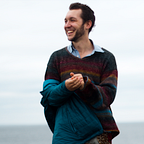In defence of the full (fried) breakfast
I went out for brunch this weekend with my cousin. It’s a trendy spot, freshly opened on my street in Edinburgh. On offer are all varieties kinds of smoothies, bowls, and pancakes — but there was one vital thing missing. And it’s easy to understand why my favourite meal would be excluded from the menu of a fashionable new café. I’ve heard a lot of scrutiny levelled at the fried breakfast, or ‘Full Breakfast’ recently. Carb heavy, containing an unspecified variety of meats and starchy foods, it’s the antithesis of modern plant-based, low-sugar dietary trends. Despite this, I think it has a deep and abiding value. This is a defence of, and my love letter to, the full breakfast.
I grew up in the Lake District National Park in the North of England. The greatest resource we had was an abundance of green space — which gave a huge amount of freedom to a teenage boy. If the weather was set to be good of a weekend, I would set about hiking. I’d embark on Friday evening, and cycle up into the mountains. In the early Summer silage is taken in, and I could camp by slinging a tarp across a bale and nestling myself into the warmth created by the fermentation in the bale. Early next morning I would set up my stove, and a busted up frying pan. In would go butter, in would go eggs, in would go bacon, and all would be fried. Porridge would be prepared in another pan and eaten with salt and jam. The leftover oats would be turned into bannock, a pan-loaf of oatmeal, half of which would accompany me on my walk until lunchtime. The other half would mop up the golden mess left in the frying pan.
The equipment required for this extravagant meal would be left with the bike, and be ferried back home later in a pannier. It might seem like quite a burdensome activity, to fry a breakfast up in the hills. Truth be told I could have made the whole journey without an overnight; it would be possible to make it up and down in a day, but that hot breakfast in the chill air was the stuff of kings. To be free, to be decadent, to eat fine things in a stunning landscape, was the very spirit of the exercise. And, of course, the mixture of fats, carbs, proteins, and the mixture of slow-release and fast-release sugars, was perfect sustaining food for a long day on the hills.
I remember very early one morning on a similar journey I came across the now-late Walter Lloyd, heading to Appleby horse fair in his bow-top caravan. He was sitting on the step, laying bacon into a pan hanging from a tripod over a small fire. He’d chopped the meat finely, allowing heat to draw out the fat from the pink curls. Moving these to one side of the pan, he used the oily bacon fat to scramble eggs. Moving these to a cool edge, he then toasted a muffin by laying it in the centre of the pan. This simple economy astounded me, and now I never travel with butter when I know the bacon fat will do.
We shared that meal in the morning sun, and I remember feeling that there could be nothing finer in the world. But I never ate it the same way again — muffins have never been a part of my breakfast. Instead, my family ate potato farl, a flat fried loaf. When visiting Irish cousins this is soda bread. Lamb’s kidneys were an occasional feature of breakfast at home, as was blood pudding — since moving to Scotland this has been replaced with the ubiquitous haggis. When travelling in America this is replaced with granary toast with marmalade, hot coffee, and crisper back bacon, which is often dark and sticky with maple syrup.
The provision of a full breakfast is the greatest hospitality a person regularly offers another. It is a moment of giving and sharing and comparison of cultures. I have dined on eggs benedict in Montreal, salmon in Vancouver, and grits in San Francisco, all while ordering the same ‘Full Breakfast’ on the menu. In one very fine B&B in Kirkcudbright breakfast included a full gammon steak. When ordering breakfast in a new place we say to the other: ‘Show me what you’ve got!’ Feed me that which, for you, is the very finest thing a person can eat. Show me what your working men gird themselves with before long hard days. Show me the medicine your youths feed themselves after waking up, heads ringing, three to a bed in the ruins of a house party. Show me the love your wives feed their husbands on Sundays. Show me the love those husbands show themselves, perhaps a little too frequently, from greasy spoons through the week.
Show me your culture. Feed me your way.
Mark Borthwick is a traditional storyteller based in Edinburgh, Scotland.
A note from Dan Fox after reading this article:
On one of those Appleby trips- I think the one on which I took the photo of Walter. His doctor had recommended that he change his diet so he was having a big pan full of only fried tomatoes, possibly with garlic.
